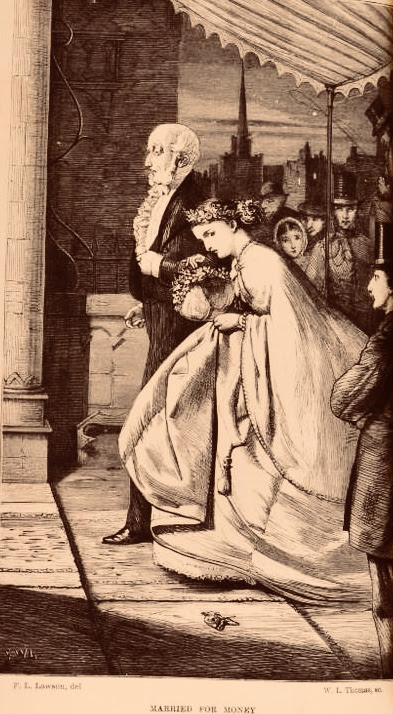“In the lower grades of society it may be supposed that courtship is equally delightful, but appearances are decidedly against it. There is nothing approaching restraint in the code of etiquette here.”
Pictured above–– “Married for the Money” from Belgravia Magazine.
In Scotland it is difficult for a man to draw the line between courtship and a connubial condition. That which in the Englishman is but a flirtation would become in the Scotchman rank matrimony. Most people in Scotland are married, but they are not aware of the fact, as Monsier Jourdain did not know that he had been talking prose all his life; the distinction is drawn when they do so become aware, and then the marriage is avowed. In Wales, courtship takes a material form — among the humbler classes at least — and resolves itself into what we call romping.
In England there are different ways of doing the same thing. When Lady Clara Vere de Vere was a pretender in her own rank of life (and she has not always trifled with the “foolish yeoman” of Tennyson's poem), the arrangements between the pair were conducted with reference to a certain degree of etiquette; but etiquette does not rule entirety, and the Lady Claras have the same tendencies to make tbe most of the situation us ladies and gentlemen who are not quite her equals in rank. She is not restrained to the same extent she would be in France; and it is hard if in the course of walks, drives and dances, croquet, cantering, exhibition-seeing, picnicking, and all the various incidents of town and country life, the pair do not manage to meet some seven days in the week, and to give the chaperone now and then the go-by.
In the lower grades of society it may be supposed that courtship is equally delightful, but appearances are decidedly against it. There is nothing approaching restraint in the code of etiquette here. When Miss Jemima Higgs has “her young man,” and he is on such terms with her family as not to be turned out of doors, he may go to the house and take her out whenever he pleases, and no one dreams of interfering. Jemima is probably a presentable style of girl — girls of her class are far more so than they were, and especially dress better than they did, albeit in rather an exaggerated style — but her betrothed is decidedly rough. See him when he comes to take her out to walk in Battersea or Victoria Park, or it may be to go by the steamer to Greenwich, he is far from being on a par with her, either in manners or attire, especially if the latter be his holiday costume.
He is tolerably sure, too, to have a pipe or a cigar in his mouth ; for this appendage, among certain classes of young men, seems to be considered a necessary part of fall dress. His talk is sad slang, and not over-refined. The girl goes off gaily with him, but one cannot help wondering at her taste, and the question inevitably occurs — what do they talk when they are alone? She has read a few novels, and picked up a certain vocabulary of sentiment ; but he cannot have an idea on this head, and his range of subjects must be a very narrow one— very different from the world of beautiful fancies open to Lady Clara Vere de Vere and the young “lord lover” who pays his homage at her shrine. It is not to be supposed that humble station and want of culture prevent people from loving as deeply as our aristocratic friends.
The late Robert Brough, in a poetical version of a tale from Boccaccio, writes very prettily of a pair of lovers who sat together saving nothing, but simply “engaged in loving,” which, the writer adds, “is quite an occupation, I assure you in its way.” Jemima and “her young man,” doubtless bring all their tender instincts toward the “occupation” in question ; but it is sad to think she will express her regret at having to sit opposite him in the bus on their way home, and that when his words take an affectionate form they will connect her with the description of “old gal.”
However, I am here writing of miserable cockneys. Village courtships must be very different affairs, or poets would not have glorified them as they have done, from the earliest period to the present time. I have my suspicions that rustic lovers are not always Damons and Philises ; but they are not likely to be without a certain rural simplicity, and are at least free from the slang of the town. The saddest kind of courtships must be those of couples who do not care about one another. It is easy enough to make people believe you love them less than you do, but very difficult to make them believe you love them more.— Belgravia, 1874
Etiquette Enthusiast, Maura J Graber, is the Site Editor for the Etiquipedia© Etiquette Encyclopedia

